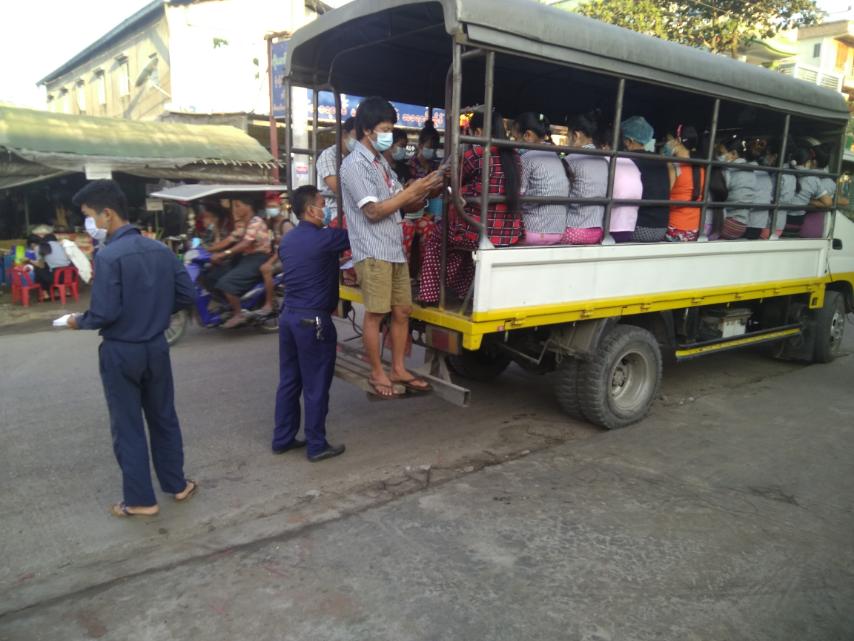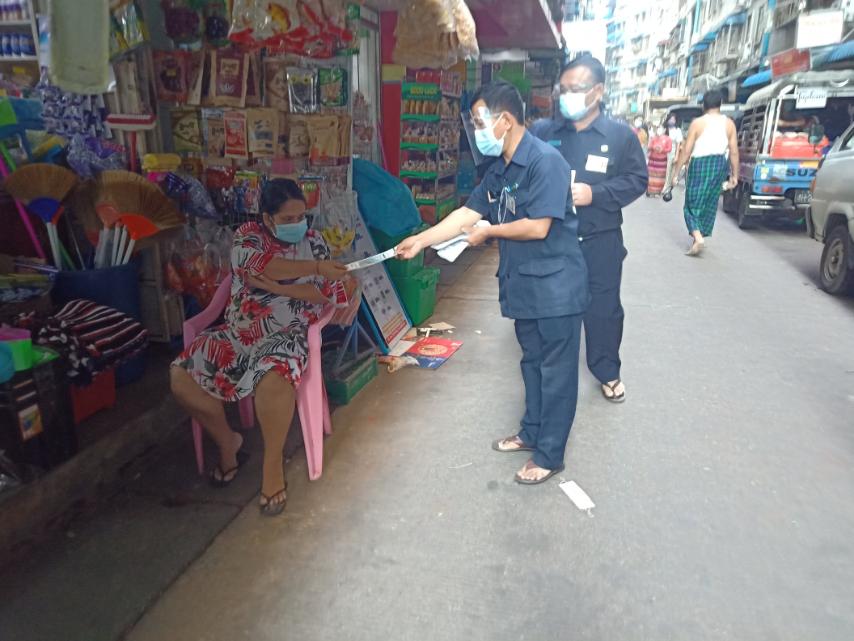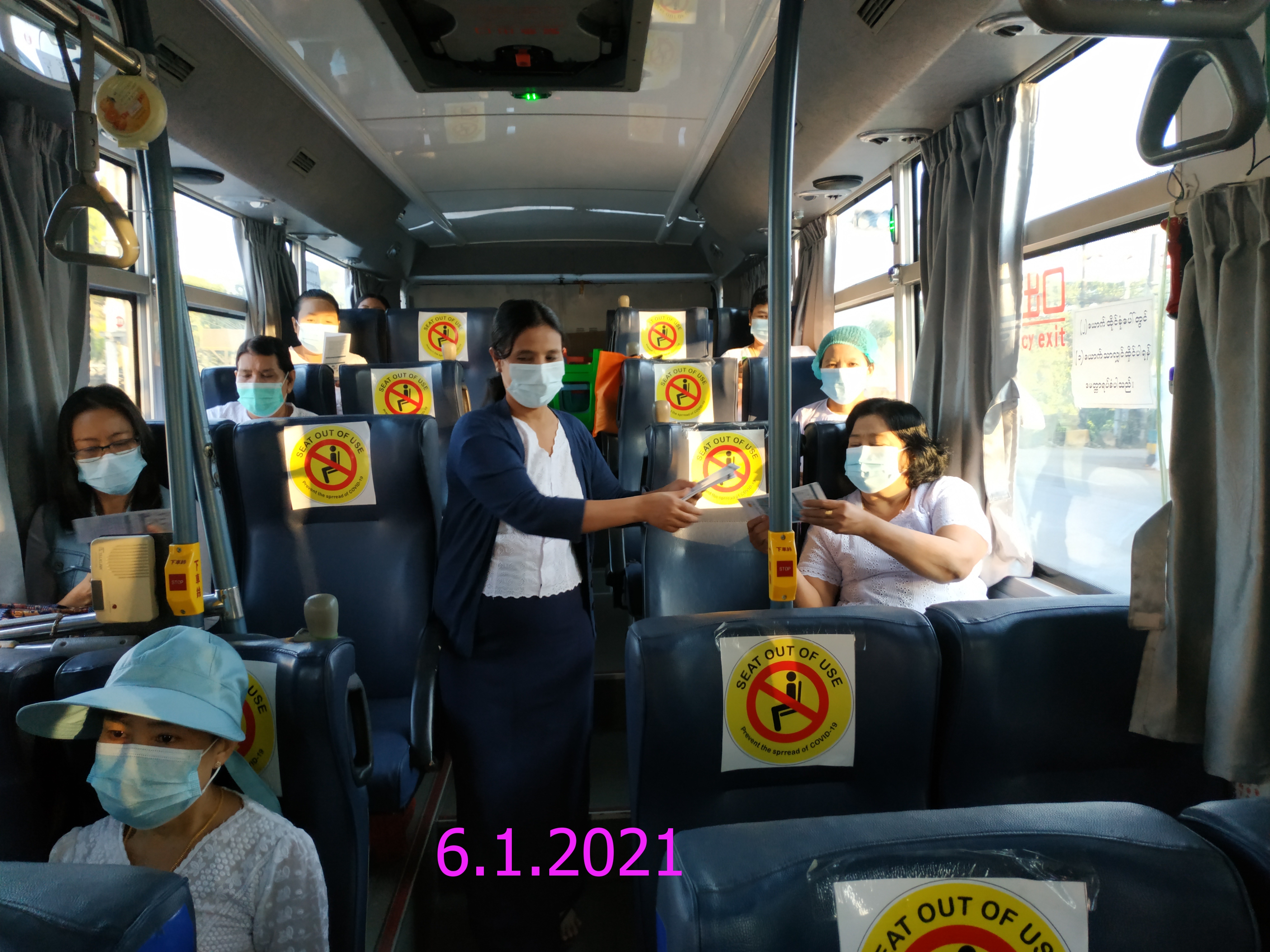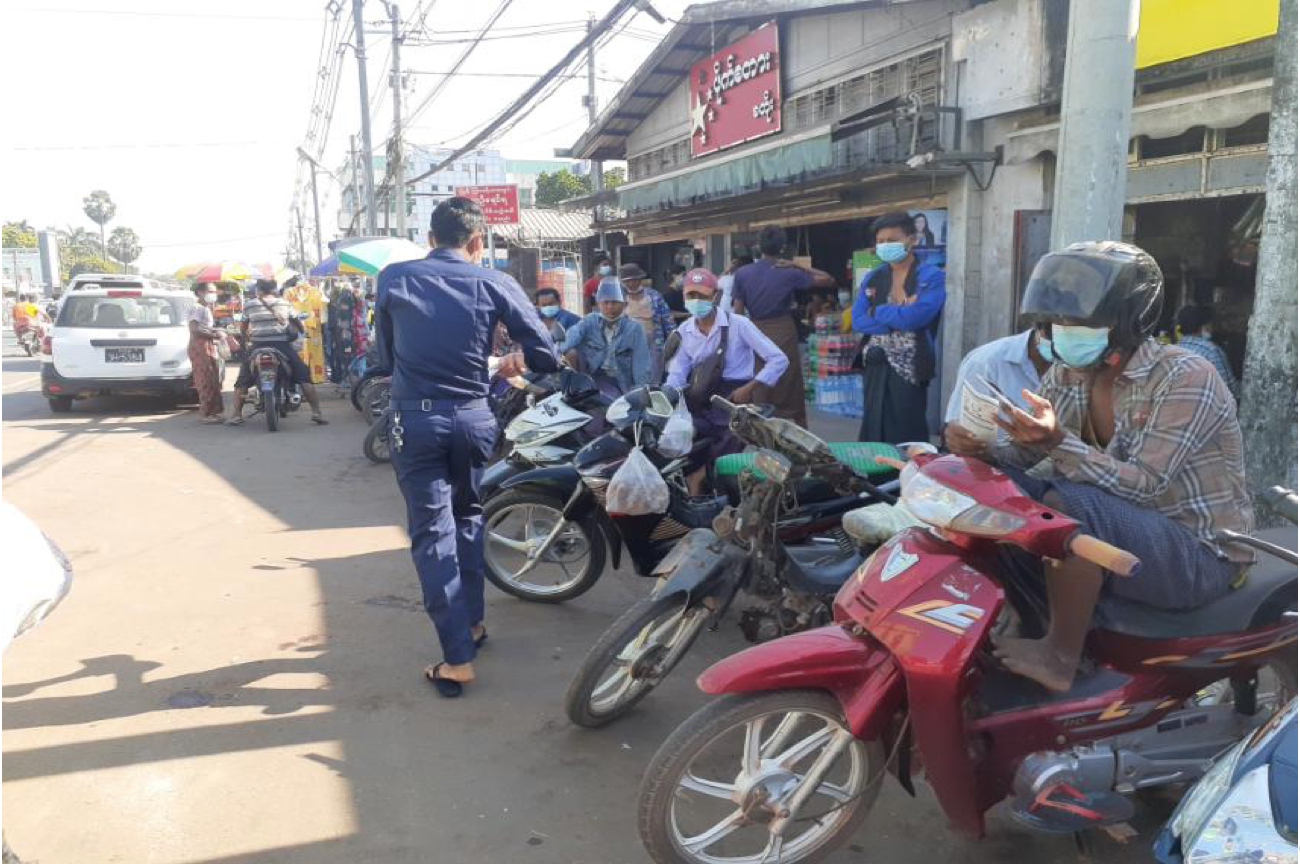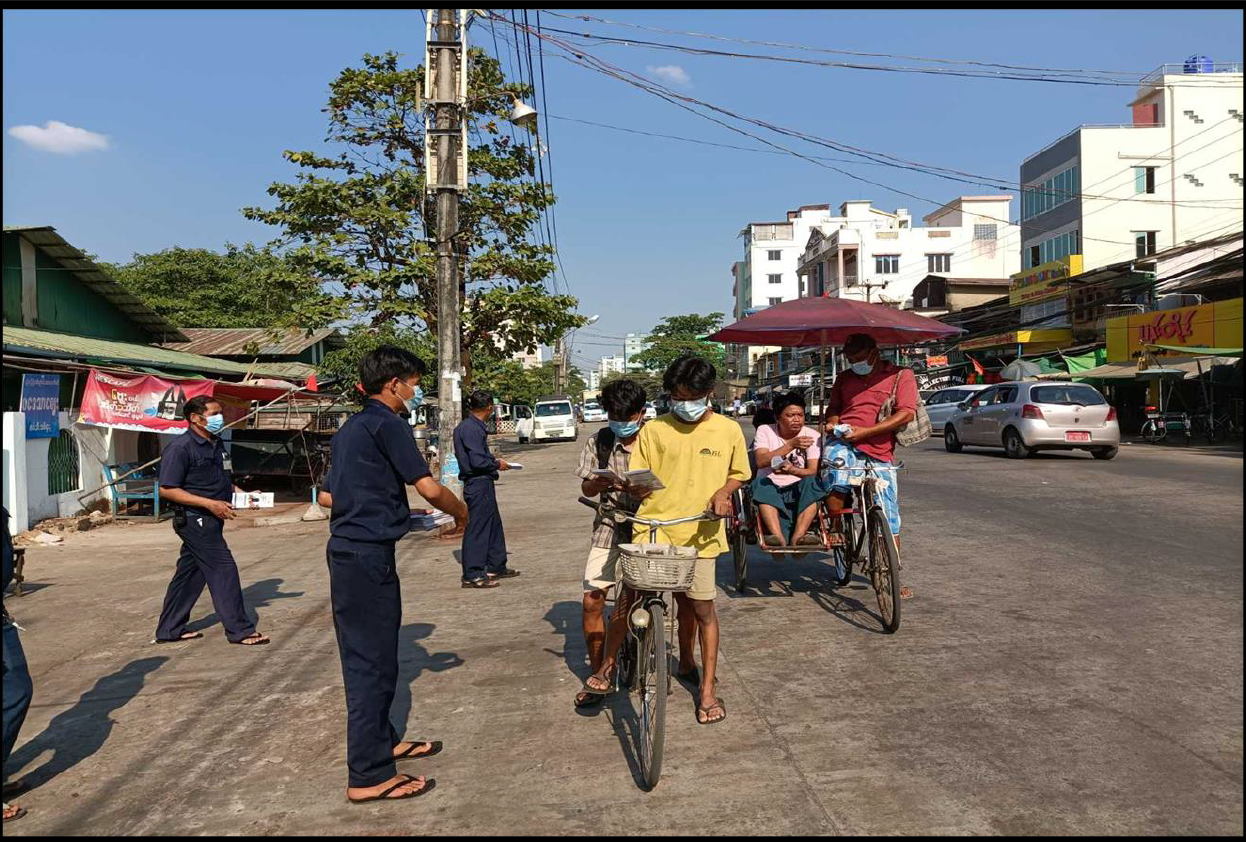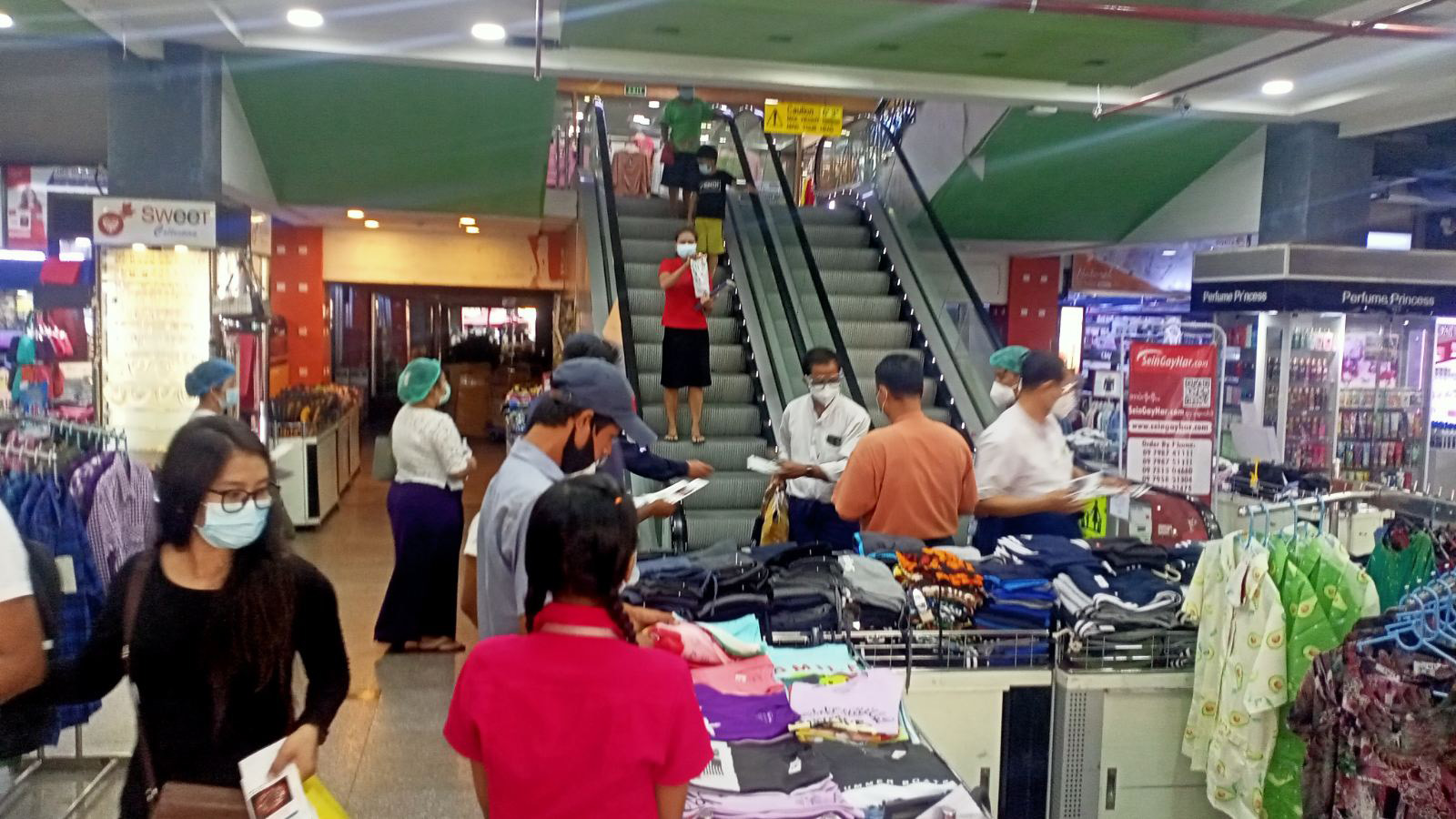Climate Festival Cologne 2025
How can cities be better prepared for the forces of nature? Cologne shows how extreme weather events are changing the city and how society and the fire department are responding with new technologies and sustainable construction methods. A look at Southeast Asia reveals how cities that have long been affected by extreme weather conditions are building and acting in a climate-adapted way. Stefan Martini (Head of the Institute for Protection and Rescue, Cologne Fire Brigade) and Professor Kraas gave exciting insights into their work and (MYrisk) research in their presentation.
Heavy earthquake in central Myanmar (28.03.2025)
On 28.03.2025, central Myanmar was hit by an earthquake measuring 7.7 on the Richter scale. Especially in the cities of Sagaing and Myandalay and the surrounding areas, people are experiencing great suffering due to massive destruction. We are mourning with and our thoughts are with the victims and their families and those affected by this disaster. The situation remains tense even days after the earthquake, as people in the affected regions are exposed to multiple risks, including heavy rains and high temperature, as well as cascading risks such as fires or diseases outbreaks.
We are very relieved that the entire MYrisk team, including our colleagues in Mandalay, Nay Pyi Taw and Taunggyi, are unharmed.
According to initial feedback from the community in Yangon, our leaflets and awareness campaigns in schools on what to do in the event of an earthquake have had an impact. It shows the importance of our work and confirms that we are contributing to the right thing.
German Conference on Disaster Risk Reduction 2025
On March 27, 2025, MYrisk held a successful online session on "Child- and Youth-specific risk communication on climate-related natural hazards" at the German Conference on Disaster Risk Reduction. After an introductory presentation on the project and our understanding of successful risk communication, the up to 33 participants were divided into four parallel breakout rooms on the topics of a) children's books on risk communication, b) risk communication in primary schools, c) risk communication in middle/high schools, and d) risk communication in universities. Intensive discussions took place and the results were written on a whiteboard.
An AI helped us to summarize the results. The result was a short movie. The information and discussions were very interesting and will help us to design further awareness campaigns and materials for children and young people.
BKK Congress 2025
From February 5 to 7, 2025, the second BBK Congress “Research for Civil Protection” took place at the World Conference Center Bonn - an outstanding event with over 900 participants and more than 150 presentations. Three days full of intensive discussions and exchanges about the latest trends in civil protection and civil defense. Dr. Sophie-Bo Heinkel and Anissa Vogel were there and took part actively, gaining valuable insights into innovative research approaches and practical solutions for preventive, transdisciplinary civil protection.
SURE status conference in Bangkok 2023
As one of the ten collaborative projects, a group of researchers from the MYrisk project also took part in the status conference in Bangkok (Thailand) from September 26-27, 2023. The group had the opportunity to learn about other projects, meet with Asian partner organizations and to present and discuss its current research results. The key question was: “How can urban areas adapt to climate change?”
Further information can be found on this page of the BMBF.
Workshop as part of the Disaster Risk Reduction Conference 2022
From Oct 25-27 2022, the German Red Cross, with the support of BBK, katNet and DKKV, organized the Disaster Risk Reduction Conference in a digital format. In this context, the MYrisk project, in collaboration with the Cologne Chamber of Commerce and Industry (IHK), conducted a workshop on "Strengthening the resilience of urban micro, small and medium-sized enterprises (MSMEs) in relation to multiple risks and complex crises". Up to 48 people joined the workshop online, which was held in English. In addition to the project partners from Myanmar, a broad international audience was represented, including participants from e.g. the Netherlands or Bosnia and Herzegovina.
The introductory presentation of Prof. Dr. Kraas on MSMEs and disaster risk reduction showed the results of the large MSME survey in the frame of the project (see previous article) and the high relevance of research in this area. Dr. Marlene Willkomm presented on flood hazard maps of Cologne and their relevance for disaster preparedness.
Afterwards, three parallel sessions on the topics a. Risk awareness in MSMEs and early warning, b. Risk reduction and disaster preparedness of MSMEs and c. Built-back-better strategies and post-disaster preparedness for MSMEs were held. According to the World-Café-concept, all participants provided input to all topics, which resulted in stimulating and fruitful discussions.
For improving of disaster preparedness for MSMEs, various actors at local and regional level must be identified. In addition to that, the governance of local actors and their coordinated action needs to be improved. Also better knowledge on DRR activites of MSMEs must be generated and access for MSMEs provided. The relevance of in-depth (qualitative) research on the MSME’s motivation for taking disaster risk reduction activities as well as the highlighting of good examples is an elementary goal for the future.
https://fachtagung-katastrophenvorsorge.de/programm/?lang=en
Press conference on results of MSME survey
On May 10th 2022, the results from the survey of micro, small and medium-sized enterprises (MSMEs) were presented at a press conference. Together with Cologne Fire Department (AFRB) and the Cologne Chamber of Industry and Commerce (IHK Köln), we were able to survey 775 companies last year about their experiences with disasters and the measures taken to minimize risks.
Prof. Dr. Frauke Kraas, together with Dr. Christian Miller (AFRB) and Dr. Nicole Grünewald (Cologne Chamber of Commerce and Industry), presented the results and the recommendations for action to be derived from them on the premises of the Cologne Chamber of Commerce and Industry. Since 83% of the MSMEs surveyed do not yet have an emergency plan, there is an urgent need to raise awareness for disaster preparedness. Disasters can affect anyone. This was most recently demonstrated by the flood disaster in the Ahr Valley, which caught many MSMEs unprepared. If MSMEs would like to improve their disaster preparedness, they can find information in a pamphlet that was also presented at the press conference. The definition of protected assets and a hazard analysis are the first steps towards an emergency plan that can help MSMEs in the event of an emergency.
After the presentations, the experts answered questions from the press. A report by Lokalzeit Köln appeared on the same day, the Kölner Stadt-Anzeiger and Radio Köln reported the following day.
Click here for more information about the IHK and here for the article in the Kölner Stadt-Anzeiger.
German Conference on Disaster Risk Reduction 2021
On Oct. 25-26, 2021 the digital Disaster Risk Reduction Conference (DRK) took place, at which Prof. Dr. Kraas was represented with a presentation in the panel 'Urban Resilience in Germany and in an International Context'.
Along with two further lectures by Prof. Dr. Hendrik Tieben from the Chinese University of Hong Kong and Prof. Dr.-Ing. Detlef Kurth from the Technical University of Kaiserslautern and a concluding discussion moderated by Dr. Holger Floeting from the German Institute of Urban Affairs, international practical examples, learnings and transfer potentials were discussed. In this context, Prof. Dr. Kraas addressed the high relevance of an efficient stakeholder-network in disaster risk management, which is also highly valued in the MYrisk project. The question of the transferability of individual concepts was also addressed in the concluding discussion. Especially the limitations of transferability to different cities need to be elaborated more.
For the MYrisk project, this year's conference on disaster risk reduction offered the opportunity to get to know the latest research findings from a wide range of disciplines within the above-mentioned panel as well as in other presentations, and we are pleased that this platform and opportunity for exchange was made possible again this year.
You can access the stroytile and roundups of the event here:
https://fachtagung-katastrophenvorsorge.de/
Press conference on MSME survey 2021
On Aug. 24, 2021, we held a press conference in cooperation with the Cologne Fire Department and the Cologne Chamber of Commerce and Industry (CCI Cologne) to provide information about the launch of the digital survey on disaster preparedness among micro, small and medium-sized enterprises (MSMEs) in Cologne.
Prof. Dr. Frauke Kraas (University of Cologne), Dr. Christian Miller (Cologne Fire Department) and Dr. Nicole Grünewald (Cologne Chamber of Commerce and Industry) spoke to representatives of the press at the Fire and Rescue Station in Cologne-Ehrenfeld, informing about the high relevance of corporate resilience to external shocks and potential extreme events, and referred to the currently ongoing online survey.
As part of the survey, Cologne-based MSMEs are being systematically questioned about their disaster resilience and disaster prevention. Subsequently, recommendations for action and guidances for the companies are to be developed in cooperation with the participating cooperation partners.
Pamphlet dissemination campaign in Yangon in January 2021
These days we receive many beautiful photos of pamphlet distribution campaigns from Yangon. The pamphlets created by project consortium were printed in 10,000 each in the Myanmar version by the YCDC. Currently YCDC disseminates the pamphlets in four districts of Yangon with 2000 per each theme and per district. The district offices allocated the pamphlets within its township offices and further to the wards. The pamphlets were also given to the Health Department, Urban Pollution Control and Cleaning Department, Drainage and Sewerage Management Department.
As part of a mask campaign to combat the SARS-CoV-2 virus in Yangon, our COVID-19 pamphlet is being distributed along with these days.
We are very happy about the great impact and awareness of our project work! With the flyers we hope to contribute to risk communication and education about natural hazards as well as to the containment of the SARS-CoV-2 virus in Yangon and Myanmar.
International Conference: Transformation Processes in Myanmar V
As centennial celebration of the University of Yangon the conference on “Transformation Processes in Myanmar V” was held on 27/28 November 2020. Since 2016 this conference is conducted every year and jointly organized by the Department of Geography of the University of Yangon and the University of Cologne. Because of the COVID-19 pandemic it took place as a digital conference (Zoom).
Five themes were particularly touched by the conference, namely
-
Environmental challenges in the transformation process of Myanmar
-
Economic potentials in the transformation process of Myanmar
-
Socio-cultural assets in the transformation process of Myanmar
-
Rural and urban opportunities in the transformation process of Myanmar
-
Consequences of the Covid-19 pandemic on urban and regional development in Myanmar
Altogether 40 papers from social sciences as well as from natural sciences were presented ranging from topics as “economic corridors as measure for development” or “lifestyle of ageing women” to “preparation of biochar and its application in soil”. Most of the papers were presented by Myanmar scholars, but also international scholars took part.
The conference was attended by more than 150 people. Besides people from Myanmar, also people from other South East Asian countries (in particular Malaysia, Indonesia, Philippines, Thailand) as well as from India, China, Hong Kong and Germany participated.
For the working group of “Multiple risks management in extreme events in fast growing (mega) cities in Myanmar” Dr. Zin Mar Than presented the topic: “Governance aspects in disaster risk reduction in townships of Yangon City”. Since the political transition towards a democratic system has started in Myanmar, substantial changes have taken place in the organization of disaster risk management. The paper focused on the challenges to implement governance structures into the disaster risk management in Myanmar.
Workshop „Are you urban ready? – Stakeholder mapping and risk communication in urban contexts (examples from Yangon, Myanmar and Manila, Philippines)“
20.10.2020, 13:00 – 14:30 Uhr
At this year's digital symposium for disaster prevention, we had the pleasure of hosting a workshop together with the German Red Cross on the topic "Are you urban ready? - Stakeholder mapping and risk communication in urban areas (example Yangon, Myanmar and Manila, Philippines)".
The symposium on disaster preparedness provided top-class speakers* such as Dr. Michel Ryan, Managing Director of the WHO Health Emergencies Programme, Prof. Dr. Gerhard Adrian, President of the World Meteorological Organization and Dr. Erin Coughlan de Perez from the Climate Centre of the Red Cross and Red Crescent as well as other experts a platform for exchange. Due to the professional moderation and professional support of the digital format, the event was evaluated as a success by a broad audience of experts.
Our workshop aimed to discuss specific challenges of risk communication in urban areas and provided practical approaches to understanding urban systems in disaster risk management. The DRC presented a current method for stakeholder analysis, which is applied or has already been applied in several southeast Asian cities. The aim is to facilitate access to urban systems for the DRC in the event of a crisis and to provide knowledge about networks. Starting from the complex risk situation in Yangon/Myanmar, Prof. Dr. Kraas presented the current results of our research project. In her presentation about institutional preparedness and risk communications in Yangon, she addressed aspects of information exchange and warning of the general public.
Eight key messages could be drawn from the workshop:
- (1) We need to understand (mega)cities (also) as risk areas.
- (2) We need to adjust methods and tools to understanding local settings.
- (3) The process is as important as the product. Thus, we need to sensitise for improved process understanding.
- (4) We need to establish a mutual learning process between experts and the general public and not just transfer of "good/best" practices. The transferred knowledge and experience needs to be understandable for everyone.
- (5) There is a shift from “regions at risk” to "people at risk" - The variability of languages, ethnic/religious, age groups change roles and perceptions from experts to learners.
- (6) We need to better link science and practice with urban realities.
- (7) The steps to improve DRR are followed by cross-cutting questions.
- (8) Beyond the stakeholder landscape we need to focus on connectivity and alliances.
The workshop was attended online by 164 participants. We were particularly pleased about the participation of our Myanmar colleagues, who, among others, contributed to a lively discussion with questions and comments. Their participation in the symposium was made possible for the first time by digitizing the conference.
We are very grateful that we got the opportunity to contribute to the digital symposium on disaster prevention 2020. We consider the reach-out of our workshop a complete success and thank all those who contributed to it.
You can access the recorded video of our session here:
Link Youtube: https://www.fachtagung-katastrophenvorsorge.de/2020/main
First Digital Conference on 9 October 2020
On 9 October 2020, we conducted our first Digital Conference 2020 on Multiple Risk Management of Extreme Events in Yangon and Cologne. It addressed representatives of governmental institutions, non-governmental organizations, researchers, who work and do research in the scope of disaster risk reduction and management. The current management of urban Covid-19 outbreaks in Yangon and Cologne was issued and discussed as well as research results of the research project “Multiple Risk Management of Extreme Events in Fast-Growing (Mega)Cities in Myanmar” were presented.
His Excellency the Mayor of the city of Yangon, U Maung Maung Soe, opened the conference. With up to 83 participants from Myanmar, Germany, and other countries the conference we evaluate as highly successful. The addressed topics were perceived as very important not only by the project consortium but also by many other participants who contributed with comments and questions to productive discussions. With our first digital conference, we made considerable progress on our goal of promoting the transdisciplinary and bilateral exchange of knowledge on disaster prevention and management. In addition to that, we were able to reach out to an extremely large audience regardless of national borders. The conference was organized by the project consortium and was funded by the German Ministry of Education and Research.
Conference in Yangon on 14 February 2020
We made it to the title pages of City News and the New Global Light of Myanmar! Due to our successful international conference on “Multiple Risks Management of Extreme Events in Yangon”. On 14 February 2020, experts from the Department of Disaster Management in Nay Pyi Taw, the Department of Meteorology and Hydrology in Yangon, the German Committee of Disaster Reduction, the Flood Protection Centre of the StEB Cologne (Germany) as well as experts from other city committees came together to share information about data on disasters as well as strategies for disaster reduction in cities of Myanmar, especially Yangon. The attendance of the deputy major of Yangon, U Soe Lwin, as well as Professor Kraas from the University of Cologne made the conference an important and successful event of knowledge exchange on disaster risk management. The conference was very well organized by the Yangon City Developments Committee.
Kick-off workshop on 7 December 2019
The kick-off workshop for phase two of the research and development project „Multiple risks management of extreme events in fast growing (mega) cities in Myanmar” took place in Yangon on December 6, 2019. The workshop was hosted by the Yangon City Development Committee (YCDC) under the auspices of Dr. Toe Aung, the deputy director general of the Urban Planning Bureau, and took place in the City Hall.
The research project on the management of multiple risks in fast-growing cities in Myanmar has met with great interest from all city partners and participating institutions in Myanmar. Thus, the workshop became a high-level event due to the presence of the Mayor of the City of Yangon, Maung Maung Soe, and the Deputy Mayor, U Soe Win, as well as the participation of the Deputy Director of the Mandalay City Development Committee (MCDC), U Soe Aung, and the Deputy Director of the Nay Pyi Taw City Development Committee (NCDC), Dr. Pwint Thandar Kyaw Kyaw. The Deputy Director from Shan State Government, U Tint Lwin, and the Deputy Director of the Mon State Government, Daw Khine Khine Soe, were also among the guests.
The workshop was the starting signal for the second phase of the project on the Myanmar side and could be considered a complete success due to the numerous and high-ranking participants and their informative presentations.
In February, YCDC will host a further international conference and a follow-up workshop on disaster preparedness in Yangon in cooperation with the University of Cologne.
Symposium for Disaster Risk Reduction 2019
We, the StEB Köln, DKKV and the University of Köln, jointly conducted our first workshop of the second project phase at the disaster preparedness symposium in Berlin! The symposium was hosted by the German Red Cross with the support of the Federal Office of Civil Protection and Disaster Assistance, the German Committee for Disaster Reduction and the Katastrophennetzwerk e.V.. The symposium was funded by the German Humanitarian Assisstance.
Our Workshop on Management of multiple risks at extreme events in (mega) cities in Myanmar addressed DRR experts working in low- and middle-income countries. Fourteen participants contributed with their expertise to fruitful discussions and valuable results. By applying the concept of world café, we discussed about the inclusion of different stakeholder in the elaboration and implementation of prevention and awareness raising concepts in Myanmar, the collection and assessment of data as well as about awareness raising measures for marginalized settlements in Yangon.
